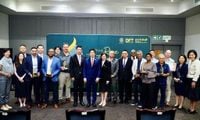Thailand's economic landscape is undergoing notable changes as the Ministry of Commerce recently reported a decrease in the export price index for February 2025, which fell by 0.8% to 110.9. This decline is primarily attributed to reduced prices in key agricultural products such as rice and cassava, driven by decreased global demand and increased competition. Mr. Poonpong Nainaipakorn, the director of the Trade Policy and Strategy Office, emphasized that the export price index's drop reflects challenges in Thailand's agricultural sector, particularly the oversupply of certain crops and the impact of changing global economic policies.
In contrast, the import price index saw a significant increase of 4%, driven by rising demand for goods necessary for production and consumption. The Ministry highlights that while agricultural product prices have faced challenges, other sectors such as electronics and industrial goods have shown resilience. The export price index for industrial goods rose by 1.6%, with gold being a standout as investors sought safe-haven assets amid geopolitical tensions.
Moreover, the demand for pet food and processed food products has surged, contributing positively to the agricultural sector's overall performance. The index for agricultural products, however, decreased by 2.3% due to a slowdown in global rice demand and competition from lower-priced alternatives. The ministry's report indicates that while the overall economic outlook is cautious, there are signs of growth in specific sectors.
In another significant development, the Thai government is actively promoting rice exports to South Africa. On March 27, 2025, a memorandum of understanding (MOU) was signed between Thai rice exporters and major South African importers, facilitating the sale of Thai rice valued at over 7 billion baht. Mr. Warawut Ramangkul, the Deputy Minister of Commerce, expressed optimism about this partnership, which is expected to enhance Thailand's rice export volume by approximately 1 million tons over the coming months.
During the event, titled "Thailand Ultimate Friendship," various activities were conducted, including the signing of the MOU, which aims to boost confidence in Thai rice quality and standards. The initiative is part of a broader strategy to strengthen Thailand's position as a leading rice exporter globally, especially in the face of fluctuating international trade dynamics.
In addition to rice, the Ministry of Commerce is also closely monitoring the automotive industry, particularly in light of the United States' recent announcement regarding a 25% import tariff on foreign-made vehicles. This measure, set to take effect on April 2, 2025, could significantly impact Thailand's automotive exports, which amount to approximately $300 million annually. Mr. Sompol Thanasathit, president of the Thai Automotive Parts Manufacturers Association, noted that this tariff could adversely affect the automotive sector, which relies heavily on exports to the U.S.
The Thai automotive industry, which includes both complete vehicles and parts, has seen exports valued at around $1.6 billion. With the new tariff policy, the industry faces potential losses exceeding $2 billion. Mr. Thanasathit expressed concerns that the tariff could lead to a decrease in competitiveness for Thai manufacturers, especially as they navigate the complexities of global supply chains.
Despite these challenges, the Thai government remains optimistic about the overall economic outlook. The Ministry of Commerce reports that the export value for January 2025 was $26,707.1 million, reflecting a 14% increase compared to the previous year. This growth is attributed to strong performances in the jewelry and electronics sectors, alongside a rebound in agricultural exports.
Moreover, the tourism sector continues to recover, with domestic tourism increasing by 3.5% in February 2025. However, international tourist arrivals have seen a decline, prompting the government to implement measures to stimulate foreign tourism. The overall economic indicators suggest a mixed outlook, with some sectors thriving while others face headwinds.
Looking forward, the Ministry of Commerce anticipates that the export price indexes will continue to fluctuate, influenced by global economic conditions and domestic production capabilities. The government is also focused on enhancing trade relations with key partners, particularly in the context of ongoing geopolitical tensions and economic uncertainties.
In summary, while Thailand's export price index has faced challenges in February 2025, the government is actively working to bolster trade in key sectors such as rice and automotive parts. The signing of the MOU with South African rice importers marks a significant step towards enhancing Thailand's agricultural exports, while the automotive industry must navigate the implications of new tariffs imposed by the U.S. As the global economic landscape evolves, Thailand's adaptability will be crucial in maintaining its competitive edge.







